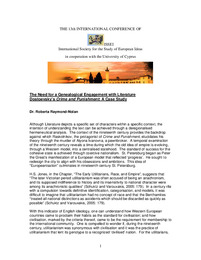The Need for a Genealogical Engagement with Literature Dostoevsky’s Crime and Punishment: A Case Study
Abstract
Readers often approach texts as artifacts, metaphors for a regimented history that has already occurred and that has been crystallized into the present concept of �progress�.This paper suggests that Literature must be examined as a tool to cognitively access an instant of the reader�s being-in-time, through a dialectical investigation � and communion with � the author�s indication of ideas that are not within our physical purview. The intellect must be challenged to consider stretched time so that the distinction of �time labels� can no longer instrumentalise the discussion of deregionalised ideas. This paper strives to reveal ideas that are permeating 19th century Western Europe, as they are reflected in Dostoevsky�s Crime and Punishment. The text will act as a case-study exemplifying the need for a genealogical engagement with fictional texts as possible documents of historiography.
